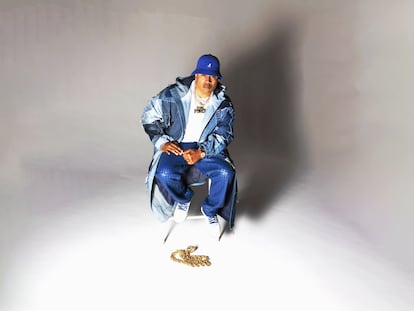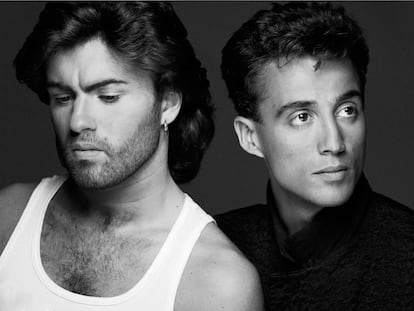Imagine Dragons: ‘The worst band ever’ or a refuge for young fans?
Led by Dan Reynolds, the group is often dismissed by critics for producing formulaic stadium rock, yet they continue to captivate millions, making them the most successful rock outfits of their generation
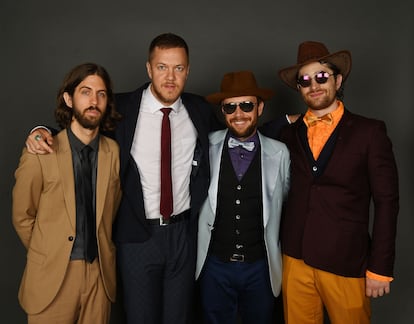
Imagine Dragons have just made a big splash with the release of their new concert film, Imagine Dragons: Live From The Hollywood Bowl. The film captures the energy of the four concerts the U.S. band performed last year in Los Angeles, accompanied by a symphony orchestra. And now they are embarking on the European leg of their Loom World Tour.
Charismatic vocalist Dan Reynolds founded the band in Las Vegas in 2008, and a year later, guitarist Wayne Sermon and bassist Ben McKee joined the group. Their debut album, Night Visions, was released in 2012 and became one of the best-selling albums of the year in the United States.
Since then, they have remained at the top of their game, releasing six albums in 13 years — including their latest, Loom (2024) — and selling 74 million albums worldwide, with a staggering 160 billion streams. In 2018, they were the most-streamed band on Spotify.
Three of their biggest hits — Believer, Thunder, and Radioactive — are, according to Billboard, the most-played rock songs of the 2010s. If they sound familiar, it’s because they’ve been played relentlessly in clubs, stores, and commercials. Imagine Dragons also hold a rare distinction: they are the only guitar-based band from their generation capable of filling stadiums. In that sense, they are a natural continuation of Coldplay, Muse, and The Killers, but with the added advantage of connecting with a younger audience.
“I think this is partly due to their ability to adapt their lyrics and messaging,” says music critic Rodri Míguez, who has followed the band closely since their early days. “They’ve always tailored their on-stage communication to a younger audience, with messages that often go viral. Their lyrics, despite belonging to a different generation, are written from a distinctly youthful perspective. Other big bands have failed to engage younger fans as their careers have evolved, and they’ve lost that differentiating factor that Imagine Dragons has been able to capitalize on.”
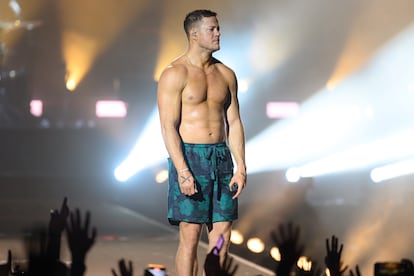
According to Míguez, they “have adapted better than anyone to the rules of musical capitalism. They continuously produce special concerts, movie screenings, merchandise, soundtracks, and collaborations— a steady stream that keeps them in the public eye, expands their fan base, and builds excitement.”
“They’re very humble people who have played for a single person, opened for a mime show, and performed 15 concerts in three days. Fame didn’t come overnight, and they’ve always been deeply grateful to their fans,” says Aina (who prefers not to reveal her surname), the administrator of the band’s social media fan pages in Spain.
Fog no obstacle
Marta Vall worked closely with Imagine Dragons on their first three albums as an international marketing manager for Interscope in Spain.
She recalls an anecdote that speaks to the band’s dedication: “In 2013, they were invited to perform at the Los 40 Principales awards in Madrid. The day before, they had a concert in Germany, and the only way they could make it to the awards was by securing a private plane. The plan was to rehearse at noon, open the show, and then leave immediately for another concert the next morning.
“At 7 a.m. on the day of the performance, their team called me: they couldn’t leave Germany due to heavy fog. Then, the tour manager reached out: ‘The guys don’t want to disappoint their fans in Spain. Let’s find a solution.’ We started looking for an airport within a 100-kilometer radius that wasn’t affected by fog. Once we found one, we arranged for vans to take them there. They finally managed to leave Germany — but by then, it was already 4 p.m.
“By the time they arrived at the venue, the audience was already entering. They barely had time to change, perform, and leave again — all for their fans. Many other artists wouldn’t have done it, but they went through the ordeal.”
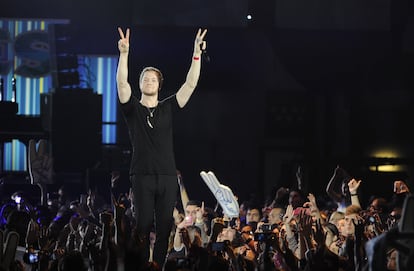
Vall also highlights the band’s commitment to social causes. “For example, the Tyler Robinson Foundation, which Dan Reynolds set up in honor of a fan of the band who had cancer, and they do a concert for it every year. The vocalist has always been very vocal in his support of people who may suffer from depression for a myriad of reasons, or other illnesses. They’re a band very aware of what young people may suffer from.”
“Imagine Dragons is more than music. It’s a refuge,” adds Aina. “It doesn’t matter if you suffer from depression, anxiety, maybe you’ve been bullied or discriminated against. The band and the fans are a family and a place where you don’t feel judged. Among us are people who have lost a loved one, who have gone through an illness, who have attempted suicide… there are some very tough stories, but we always have this in common: Imagine Dragons’ music helps us heal those wounds. Last year, I had a relapse of my depression; it was a really tough few months. Dan also suffers from depression. I asked him a question about it during a live show the band did with fans, and his answer helped me get back into therapy. He’s helped so many of us.”
What’s more, as Rodri Míguez points out, “they have always taken a clear and direct stance against discrimination against the LGBTQ+ community. While this has led to rejection from certain segments of society, it has also earned them strong support from those affected by these issues.”
“They have also raised the trans flag,” adds Sebas Alonso, director of the music website Jenesaispop. “Some may argue that they’re capitalizing on the queer community, but I see it as a positive step. It’s important for straight, cisgender male rock bands to position themselves as allies and challenge toxic masculinity. Some of their lyrics, like Demons, touch on these themes.“
“It’s also true that supporting diversity has been the general tone of artists and brands in recent years,” Alonso continues. “With the growing backlash in the U.S. and parts of Europe, and with trans rights under threat, let’s hope Imagine Dragons continue to fly the LGBTQ+ flag. Over the next four years under Donald Trump, we’ll see who truly supported the cause — and who was just along for the ride.”
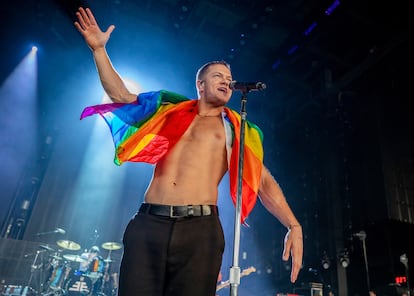
Some of the band’s actions have also been questioned by progressive sectors. In the summer of 2023, they performed in Tel Aviv, disregarding calls from organizations urging them to support the boycott of Israel.
They also faced criticism from System of a Down vocalist Serj Tankian for performing in Azerbaijan, as he believed it legitimized the authoritarian regime of Ilham Aliyev. “I don’t believe in depriving our fans who want to see us play because of the acts of their leaders and their governments, I think that’s a really slippery slope. I think the second you start to do that, there’s corrupt leaders and warmongers all over the world, and where do you draw the line?” responded Dan Reynolds.
A style without style
Perhaps what has made Imagine Dragons both adored and criticized the most is their sound, which pulls influences from a wide range of genres. Dan Reynolds has cited Arcade Fire, Nirvana, Muse, The Beatles, Paul Simon, Coldplay, Linkin Park, Harry Nilsson, and U2 as inspirations, while also naming Foster The People and Mumford & Sons as examples of alternative bands that paved the way for their commercial success.
“They make music expressly designed for big stadiums,” says Alonso. “It’s as if they’ve taken cues from every band that has ever done it: they mix the drums and vocals of We Will Rock You by Queen with the messianic, feel-good energy of U2 and Coldplay. Some of their phrasing is reminiscent of Eminem, their riffs could be compared to Red Hot Chili Peppers, and their melodies wouldn’t be out of place in a Katy Perry song. Imagine Dragons is a band that mixes everything up to please everyone. Except the music critics, of course.”
Indeed, their albums have never been well received by critics. In 2019, the American magazine Spin published an article titled “Is Imagine Dragons the Worst Band Ever?”, which particularly criticized their lyrics, describing them as “a composite of motivational platitudes and pseudo-dramatic yelps, barely merit repeating, if only because Reynolds seems so willing to do that himself.”
“Their lyrics may explicitly talk about death, cancer, physical pain, a threatened divorce, toxic masculinity... but they tend to be very literal and obvious, very unimaginative. Let’s say they’re functional,” notes Sebas Alonso.
Rodri Míguez, however, sees it differently: “A large part of the band’s success comes from those lyrics. They are always precise, addressing real issues that resonate with people — regardless of the fact that they’re sung by a multimillionaire. They make anyone reflect and empathize.”
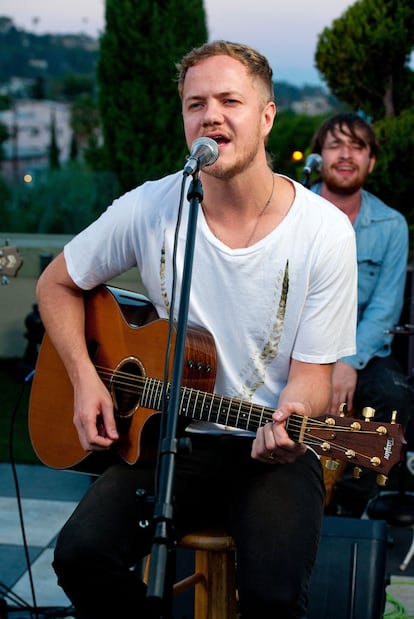
Another controversial aspect of the band is the lack of a clearly defined sound. According to Aina, “Imagine Dragons has often been criticized for not sticking to a single genre. They do what they want and play with all kinds of sounds, but Dan is able to give it his own identity.”
“I recently interviewed a Dutch band, Chef’s Special, who I understood to be influenced by Imagine Dragons,” recalls Sebas Alonso. “They told me no, but added: ‘We like how Imagine Dragons tries to give a modern interpretation of what a rock band is.’ Few rock or so-called rock bands have blended pop, rap, and electronic music the way they have. As a result, they’ve resonated with an unprejudiced generation that doesn’t get caught up in debates like ‘this is too tacky,’ ‘this isn’t subtle enough,’ ‘this isn’t alternative enough,’ or ‘this isn’t rock enough.‘”
He continues: “I remember disliking them at first, but then hearing them on New Year’s Eve at a relatively underground venue like Ochoymedio in Madrid, and thinking: I completely get why they’re successful. They thrive in grand, larger-than-life moments — stadiums, massive festivals, New Year’s Eve celebrations… or in this lingering sense of the world ending that we’ve had since 2020.”
It doesn’t seem like critical approval is a major concern for the band. In Europe, their stadium concerts are expected to sell out — despite the high ticket prices.
Sign up for our weekly newsletter to get more English-language news coverage from EL PAÍS USA Edition
Tu suscripción se está usando en otro dispositivo
¿Quieres añadir otro usuario a tu suscripción?
Si continúas leyendo en este dispositivo, no se podrá leer en el otro.
FlechaTu suscripción se está usando en otro dispositivo y solo puedes acceder a EL PAÍS desde un dispositivo a la vez.
Si quieres compartir tu cuenta, cambia tu suscripción a la modalidad Premium, así podrás añadir otro usuario. Cada uno accederá con su propia cuenta de email, lo que os permitirá personalizar vuestra experiencia en EL PAÍS.
¿Tienes una suscripción de empresa? Accede aquí para contratar más cuentas.
En el caso de no saber quién está usando tu cuenta, te recomendamos cambiar tu contraseña aquí.
Si decides continuar compartiendo tu cuenta, este mensaje se mostrará en tu dispositivo y en el de la otra persona que está usando tu cuenta de forma indefinida, afectando a tu experiencia de lectura. Puedes consultar aquí los términos y condiciones de la suscripción digital.
